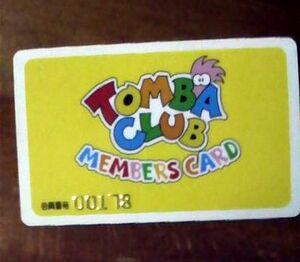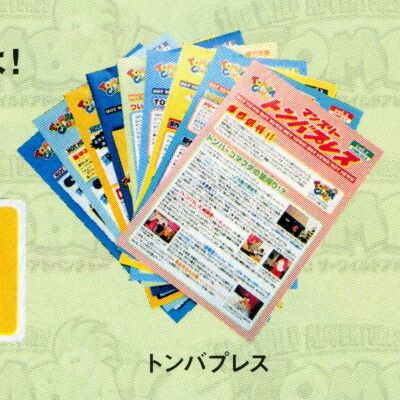Tomba Club: Difference between revisions
| Line 6: | Line 6: | ||
The Japanese releases of both games included a postcard with a small questionnaire that could be sent in to give feedback to the developers.<ref>In Japan this was a common practice for video game releases around this time. The original Tomba release predated the establishment of the Tomba Club but already included such a questionnaire.</ref> The questionnaire contains sections asking the respondent to rate various aspects of the game, reasons for purchasing, preferred game genres, sources of game information, and whether they have seen the TV commercial or played the previous game. | The Japanese releases of both games included a postcard with a small questionnaire that could be sent in to give feedback to the developers.<ref>In Japan this was a common practice for video game releases around this time. The original Tomba release predated the establishment of the Tomba Club but already included such a questionnaire.</ref> The questionnaire contains sections asking the respondent to rate various aspects of the game, reasons for purchasing, preferred game genres, sources of game information, and whether they have seen the TV commercial or played the previous game. | ||
When sent in, Whoopee Camp would mail back an application form that would allow fans of the game to become a member. | When sent in, Whoopee Camp would mail back an application form that would allow fans of the game to become a member of the club. | ||
== Tomba Press == | == Tomba Press == | ||
Revision as of 15:16, 25 May 2024

The Tomba Club was the official fan club of Tomba developer Whoopee Camp. Established in October 1998, the club served as a communication tool to connect Whoopee Camp with its fans, facilitating direct exchanges of opinions and providing exclusive information and merchandise that was not available to the public. Members would receive a membership card and were sent a monthly Tomba Press publication.
Application process
The Japanese releases of both games included a postcard with a small questionnaire that could be sent in to give feedback to the developers.[1] The questionnaire contains sections asking the respondent to rate various aspects of the game, reasons for purchasing, preferred game genres, sources of game information, and whether they have seen the TV commercial or played the previous game.
When sent in, Whoopee Camp would mail back an application form that would allow fans of the game to become a member of the club.
Tomba Press
The Tomba Press (トンバプレス) was a publication mailed exclusively to Tomba Club members. According to the Whoopee Camp website, it was published irregularly—the publication itself was titled "Monthly Tomba Press". It contained company updates, special content, and information that cannot be found elsewhere. It also informed members about upcoming club events, such as playtest sessions for games in development.
The Japanese Tomba! 2 booklet features a small photo of a number of the Tomba Press publications:
The Whoopee Camp website describes a playtest session that was conducted with club members:
Last year,[2] we held a monitor session for a new game. Members who participated were able to enjoy playing a game that was still in the development stages, and it seems they had a good time. This monitor session was not only an event for the members to have fun but also a great opportunity to hear the users' raw feedback, which was helpful for subsequent game development. We will continue to hold such events and will announce them via the Tomba Press, our website, and other channels.
Not much else is known about the actual contents of any of the Tomba Press publications, as no issues are ever known to have been archived or described.
Images
Full questionnaire form included with Tomba! 2 for joining the Tomba Club
Notes
External links
- Information about the Tomba Club and Tomba Press on the Whoopee Camp original website, archived on the (2000)


